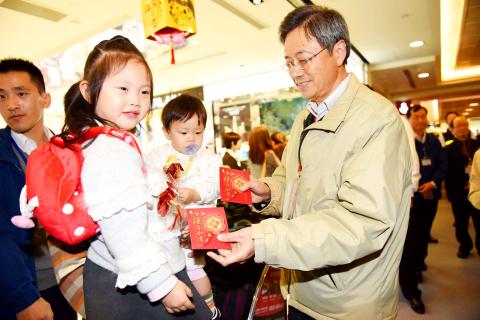Premier Simon Chang (張善政) yesterday said that between 20 and 30 bills among the 149 bills sent to the Legislative Yuan have been marked as “priority bills,” including controversial drafts establishing an oversight mechanism for the cross-strait agreements and long-term care service insurance bill.
Chang said in a radio interview yesterday that the priority bills the Executive Yuan identified are those that are deemed important, adding that the government understands that the bills might not be completely accepted by the legislature, but hopes the two sides could have an open mind when discussing them.
“For example, the long-term care service insurance act: The Executive Yuan upholds the version using the idea of insurance [for the funding of the service] while the Democratic Progressive Party [DPP] calls for increasing [certain] taxes,” Chang said, adding that the Executive Yuan’s version is not “worthless” and has its pluses.

Photo: CNA
“I wish to pass a version that condenses the strong points of the two proposals,” he said.
However, the most controversial bill is for institutionalizing a cross-strait agreement oversight mechanism.
“There are versions that call for the participation of legislators in the cross-strait negotiations, or holding civil servants legally accountable when the negotiation yields unacceptable outcomes, which would place great pressure on civil officials,” Chang said.
When asked about the idea of a “two-state doctrine” being embedded in the version proposed by civil groups, in which the wording presupposes the negotiation takes place between two states (the Republic of China and the People’s Republic of China), the premier said the DPP should act pragmatically.
“Unless you plan to stop talking to [China] in the years to come, I think we need to take [China’s] stance into consideration. You have to be practical. However, how and to what extent are the questions that need be carefully weighed by the DPP and Chairperson Tsai Ing-wen (蔡英文),” he said.
In response to the DPP and the New Power Party caucuses’ call for a suspension of the review of an application to acquire cable and Internet services provider China Network Systems Co, the premier said the Ministry of Economic Affairs’ Investment Commission has not scheduled a review for the case, adding that because the commission is an independent committee, the Executive Yuan would not intervene in its operation.
“However, if the legislature reaches a resolution requiring the commission to halt the review before the committee schedules a review, it is very likely that the commission would respect the decision,” Chang added.
He nevertheless said he was concerned about Taiwanese mistrust of foreign acquisition, which might hinder the nation’s entry into regional economic organizations.
“When I was dealing with [the country’s intended application for joining] the TPP [Trans-Pacific Partnership] and RCEP [Regional Comprehensive Economic Partnership], some told us that Taiwan’s review of foreign investment is not transparent enough. This clearly shows that, for Taiwan to be a member of the TPP or RCEP, a lack of transparency would be a barrier.”

Civil society groups yesterday protested outside the Legislative Yuan, decrying Chinese Nationalist Party (KMT) efforts to pass three major bills that they said would seriously harm Taiwan’s democracy, and called to oust KMT caucus whip Fu Kun-chi (傅?萁). It was the second night of the three-day “Bluebird wintertime action” protests in Taipei, with organizers announcing that 8,000 people attended. Organized by Taiwan Citizen Front, the Economic Democracy Union (EDU) and a coalition of civil groups, about 6,000 people began a demonstration in front of KMT party headquarters in Taipei on Wednesday, organizers said. For the third day, the organizers asked people to assemble

Taipei is participating in Osaka’s Festival of Lights this year, with a 3m-tall bubble tea light installation symbolizing Taiwan’s bubble tea culture. The installation is designed as a bubble tea cup and features illustrations of Taipei’s iconic landmarks, such as Taipei 101, the Red House and North Gate, as well as soup dumplings and the matchmaking deity the Old Man Under the Moon (月下老人), affectionately known as Yue Lao (月老). Taipei and Osaka have collaborated closely on tourism and culture since Taipei first participated in the festival in 2018, the Taipei City Department of Information and Tourism said. In February, Osaka represented

POOR IMPLEMENTATION: Teachers welcomed the suspension, saying that the scheme disrupted school schedules, quality of learning and the milk market A policy to offer free milk to all school-age children nationwide is to be suspended next year due to multiple problems arising from implementation of the policy, the Executive Yuan announced yesterday. The policy was designed to increase the calcium intake of school-age children in Taiwan by drinking milk, as more than 80 percent drink less than 240ml per day. The recommended amount is 480ml. It was also implemented to help Taiwanese dairy farmers counter competition from fresh milk produced in New Zealand, which is to be imported to Taiwan tariff-free next year when the Agreement Between New Zealand and

Taiwanese professional baseball should update sports stadiums and boost engagement to enhance fans’ experience, Chinese Professional Baseball League (CPBL) commissioner Tsai Chi-chang (蔡其昌) told the Liberty Times (sister paper of the Taipei Times) in an interview on Friday. The league has urged Farglory Group and the Taipei City Government to improve the Taipei Dome’s outdated equipment, including relatively rudimentary television and sound systems, and poor technology, he said. The Tokyo Dome has markedly better television and sound systems, despite being 30 years old, because its managers continually upgraded its equipment, Tsai said. In contrast, the Taipei Dome lacked even a room for referees